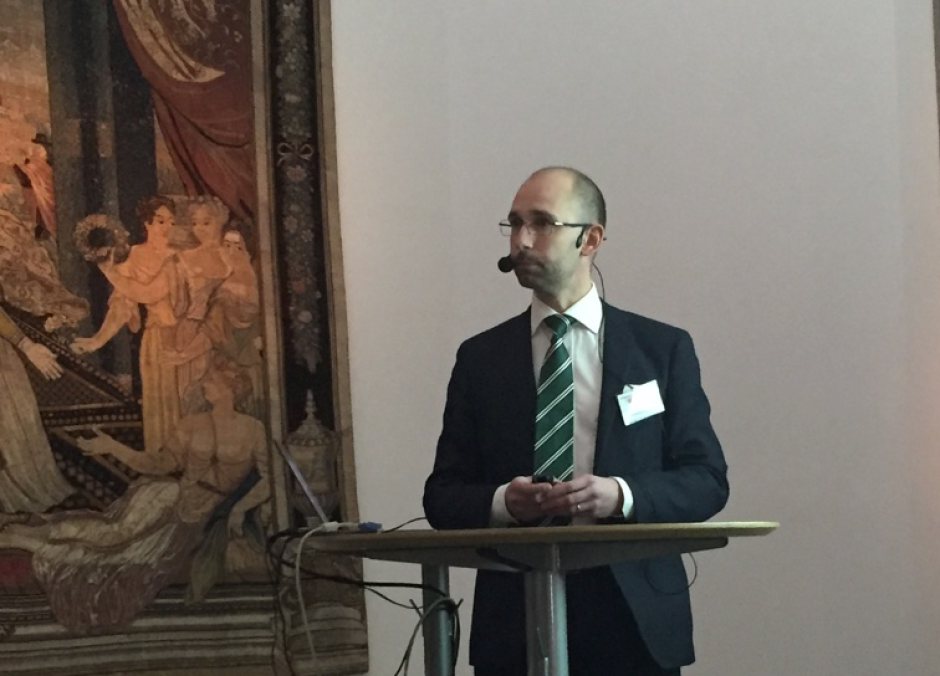Research and knowledge-sharing at this year´s Transportforum in Linköping

Transportforum 12-13 January offered several shipping seminars including inland waterways, what has happened after the sulphur regulations and maritime informatics.
Socioeconomic benefits with inland waterways
Several of the speakers at this year's Transportforum saw the benefits of inland waterways.
- Emissions to air can be reduced if inland waterways and new fuels are used to a higher extent. The study made suggests that one can reduce costs by 42 million per year in socioeconomic benefits, Joakim Swahn from M4traffic said.
There are a few projects in Stockholm that will utilise water as a transport route.
- Inland waterways can reduce the burden on land infrastructure. The project in Stockholm will transport rocks and stones by sea instead of by trucks, Johan Lantz, CEO of Avatar Logistics said.
The speakers at the session on inland waterways concluded with the following message: remember the fifth transport mode - there are potential and solutions ready to be tested, and on-going projects show that there are socioeconomic benefits with inland waterways.
Consequences of sulphur regulations
The consequences of sulphur regulations that came into force in January 2015 was the next theme on the agenda. Johan Mellqvist from Chalmers presented a research project that has measured sulphur emissions by using plumes.
- Only 0.5% of the plumes have a sulphur content higher than 0.4%, which means that even most international shipping companies seem to comply with regulations, said Johan Mellqvist.
Ylva Eriksson from Transport Analysis showed that few significant changes have occurred since the sulphur regulations, however, the study will continue during 2016.
- What we can see up to date is that the quantity of goods in total and the amount of cargo from the east coast to the west coast is not reduced. Our final report will be released in 2016, said Ylva Eriksson.

Maritime Informatics
An additional session focused on maritime informatics, where a lot of things are happening. For instance, a pre-study by Chalmers University of Technology, Viktoria Swedish ICT, Wallenius and Stena is currently conducted with financing from Lighthouse.
Mikael Lind and Mikael Hägg presented the possibilities with maritime informatics.
- Maritime informatics can for instance be used to synchronise ships with other modes of transport and to improve safety on board vessels, Mikael Lind said.

Possibilities to avoid collisions with the help of automation was the theme of Michael Bauldauf´s, Researcher at World Maritime University, presentation.
- Making use of sophisticated models to predict the manoeuvring areas allow objective quantification of the risk of collision, Michael Baldauf said.

Thomas Porathe discussed what happens to the navigator when technology takes over and when the ship becomes more and more automated.
- A lot of information is given to the crew today, but they need the correct information at the right time. The problem today is unnecessary feedback and interaction - not over-automation. The big question is - "how do we make automation a team player?", Thomas Porathe said.

Michael Lind summarised the seminar and said that Maritime Iinformatics is important, we must gain knowledge from other modes of transport and we need several different methods and tools to contextualise the area.
Find the presentations here.
Read more about Transportforum and find all presentations here.
-
 Ny studie: Eldrivna pendelbåtar kan effektivisera Stockholms kollektivtrafik
Ny studie: Eldrivna pendelbåtar kan effektivisera Stockholms kollektivtrafik -
 EU: Sjöfartens utsläpp ökar
EU: Sjöfartens utsläpp ökar -
 Sociala relationer påverkar val av bränsle
Sociala relationer påverkar val av bränsle -
 Sjöfartens omställning kräver ”mjukare” påtryckningar
Sjöfartens omställning kräver ”mjukare” påtryckningar -
 Hon hade avtalad tid med Kapten ynkrygg
Hon hade avtalad tid med Kapten ynkrygg -
 Lighthouse omvärldsanalys 2025 – osäkerhet och tullar präglar sjöfarten
Lighthouse omvärldsanalys 2025 – osäkerhet och tullar präglar sjöfarten -
 Se seminariet Shipping in the Marine Environment
Se seminariet Shipping in the Marine Environment -
 Vad betyder egentligen de 90 procenten?
Vad betyder egentligen de 90 procenten? -
 Hålla där...
Hålla där... -
 Ny rapport: Klimatförändringarna ett hot mot de flesta större hamnar i världen
Ny rapport: Klimatförändringarna ett hot mot de flesta större hamnar i världen

